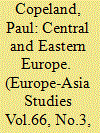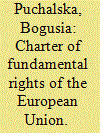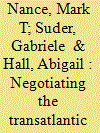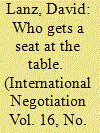| Srl | Item |
| 1 |
ID:
128993


|
|
|
|
|
| Publication |
2014.
|
| Summary/Abstract |
This article analyses the influence and status of the Central and Eastern European states within an enlarged European Union. It analyses two European Union policy negotiations: the Services Directive and the European Union's Financial Crisis Rescue Plan. Central to understanding the influence of a member state within negotiations are its economic size and knowledge of the Brussels policy-making apparatus. Nevertheless, as the new member states from Central and Eastern Europe have gained experience of the European Union policy negotiation process, they remain limited in their ability to influence outcomes. Therefore it can be concluded that while knowledge during negotiations is a necessary condition for successfully influencing outcome, alone it is insufficient because economic weight is particularly pertinent to those outcomes. As a result, the status of the new member states within the European Union is best described as being that of a junior partner, despite the assumed parity of Union membership.
|
|
|
|
|
|
|
|
|
|
|
|
|
|
|
|
| 2 |
ID:
128994


|
|
|
|
|
| Publication |
2014.
|
| Summary/Abstract |
The proclamation of the Charter for Fundamental Rights of the European Union, in December 2000 at Nice, France, followed by its inclusion within the failed Constitutional Treaty and its current status as a legally binding document under the Treaty of Lisbon, charts the changing fortunes of European Union politics dealing with fundamental rights protection. This article outlines the main rationales and hopes behind the enactment of the Charter and notes that through the process of political conditionality it may have been devalued from its very conception. The article suggests that, following their accession, Poland, and later the Czech Republic, used the Charter and Lisbon Treaty negotiations, including their opt-outs from the Charter, to engage in a game of power politics that had both domestic and European undertones. This politics of power game-play reflected a need by both states, and Poland in particular, to respond to both the political conditionality that they had been required to sign up to as part of the accession process and to emphasise how membership had improved their negotiating power. The article suggests that the consequence of this action by both states has not only further devalued the Charter but potentially undermined the rights of Polish and Czech citizens.
|
|
|
|
|
|
|
|
|
|
|
|
|
|
|
|
| 3 |
ID:
170579


|
|
|
|
|
| Summary/Abstract |
he immediate challenge is to consolidate progress already made and grab the low-hanging fruit
|
|
|
|
|
|
|
|
|
|
|
|
|
|
|
|
| 4 |
ID:
087374


|
|
|
|
|
| Publication |
2009.
|
| Summary/Abstract |
political constituency represented in all
Israeli coalition governments. Successive
Israeli governments have provided fi nancial
means and protection to the settlers
with near total disregard for the profound
impact on Israeli-Palestinian relations. As
a result, any Israeli peace overture under
these circumstances has been viewed by
the Arab states as an empty slogan and a
cynical attempt to sway public opinion.
Contrary to the facts on the ground, as the
occupation becomes less and less tenable,
Israeli governments continue to justify it
as indispensable to national security in an
effort to justify further entrenchment.
|
|
|
|
|
|
|
|
|
|
|
|
|
|
|
|
| 5 |
ID:
088129


|
|
|
|
|
| Publication |
2009.
|
| Summary/Abstract |
Between 1944 and 2002, the United States sought to create a competitive and commercially driven international civil aviation regime. It tried to peel away politically inspired regulations, which fragmented the marketplace, and deliver efficiencies and consumer benefits. In contrast with the American liberal tradition-albeit with limitations-the industry in Europe was over-regulated and largely based on subsidised state-owned carriers with international market quotas. Thus for many years Europe and the U.S. followed different paths; but political and economic dynamics conspired together in the 1980s and early 1990s to produce remarkable change in the European Community and, by 1997, there were the makings of a competitive and lightly regulated single market, which brought it close to U.S. practice. Since 2002, the United States has been less liberal in its airline policies; the EU has been more liberal. It would be an irony indeed if the great regime liberaliser since 1944 were now to become a force of regulatory conservatism that denied consummation to the vision of a transatlantic open aviation area that could be a magnet to draw in the rest of the world into a truly global commercial airline market.
|
|
|
|
|
|
|
|
|
|
|
|
|
|
|
|
| 6 |
ID:
146828


|
|
|
|
|
| Summary/Abstract |
This article analyzes the effectiveness of an international, interdisciplinary simulation of an ongoing trade negotiation. It thoroughly describes the simulation, provides links to background information for public use, and offers suggestions on ways to further strengthen the learning outcomes achieved.
|
|
|
|
|
|
|
|
|
|
|
|
|
|
|
|
| 7 |
ID:
056551


|
|
|
| 8 |
ID:
105187


|
|
|
|
|
| Publication |
2011.
|
| Summary/Abstract |
Who gets a seat at the table and who does not is an important consideration for successful peacemaking. However, current research does not provide sufficient guidance for understanding the politics of participation in peace negotiations. This article develops a conceptual framework for understanding these dynamics. Its central theme is that the inclusion or exclusion of a given actor in peace negotiations is affected by two independent factors. One factor pertains to the practical requirements of the peace process and addresses the following question: does the participation of a given actor augment the chance of reaching a sustainable peace settlement? The other factor relates to the normative dimension of peace talks: is the participation of a given actor consistent with the values of international mediators and sponsors of peace negotiations? The article argues that the dynamics of inclusion and exclusion result from the interplay of these two factors. The most straightforward situation for mediators is when practical requirements and international norms are mutually reinforcing. Difficulties arise from scenarios where practical effectiveness and norms contradict each other. This is the case when the involvement of a given person (or group) is imperative in terms of the peace process, but difficult to justify politically because this person has committed terrorist acts or is indicted by an international court.
|
|
|
|
|
|
|
|
|
|
|
|
|
|
|
|
| 9 |
ID:
102943


|
|
|
|
|
| Publication |
2011.
|
| Summary/Abstract |
Will Clayton, a principal architect of the United States' post-1945 plans, was committed to trade liberalization as a path to economic recovery. This article examines Clayton's efforts to secure early commitment from Western European nations to economic integration, as he negotiated details of the United States' offer of Marshall Plan aid to Europe in 1947. It focuses on his attempts to persuade an unwilling Britain to assume leadership of this cause. It examines the contradictions between the practicalities of achieving closer European economic integration and the non-discrimination provisions of the proposed International Trade Organization. Tensions are examined between Clayton and his colleagues over the priority to be accorded to closer European economic integration. It concludes that, although Clayton was not successful in obtaining a clear commitment from the Europeans to economic integration, he did much to further the intellectual arguments and establish the climate where this became a reality within ten years.
|
|
|
|
|
|
|
|
|
|
|
|
|
|
|
|